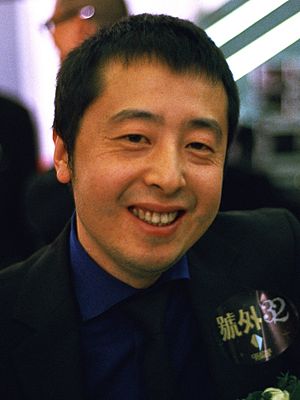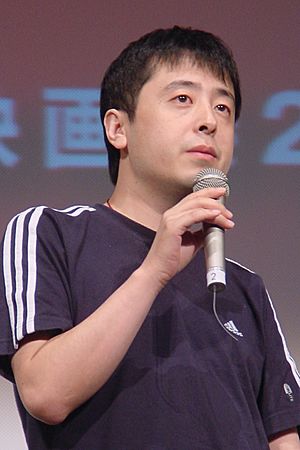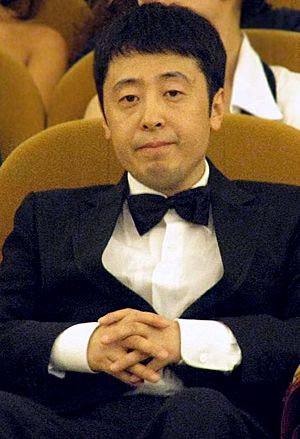Jia Zhangke facts for kids
Quick facts for kids
Jia Zhangke
|
|
|---|---|
| 贾樟柯 | |

Jia in 2008
|
|
| Born | 24 May 1970 |
| Citizenship | China |
| Education | Beijing Film Academy |
| Occupation | Film director, screenwriter, film producer |
| Years active | 1995–present |
|
Notable work
|
A Touch of Sin Ash Is Purest White Still Life Platform |
| Style |
|
| Movement | Sixth Generation |
| Spouse(s) |
Zhu Jiong
(m. 1999; div. 2006)Zhao Tao
(m. 2012) |
| Awards | Venice Film Festival – Golden Lion 2006 Still Life Asian Film Awards – Best Director 2006 Still Life Asian Film Awards – Best Screenplay 2015 Mountains May Depart Golden Horse Awards – Best Original Screenplay 2015 Mountains May Depart |
| Jia Zhangke | |||||||||
|---|---|---|---|---|---|---|---|---|---|
| Simplified Chinese | 贾樟柯 | ||||||||
| Traditional Chinese | 賈樟柯 | ||||||||
|
|||||||||
Jia Zhangke (born on May 24, 1970) is a famous Chinese film director, writer, and producer. He is known for making movies that show real life in China. He also helped start the Pingyao International Film Festival.
Jia is seen as a leader of the "Sixth Generation" of Chinese filmmakers. This group includes directors like Wang Xiaoshuai and Lou Ye. His early movies were made without government approval, so they were called "underground" films. Later, he started making movies with official permission.
His films have won many awards around the world. One of his most famous films, Still Life, won the top prize, the Golden Lion, at the Venice Film Festival. He also received a special lifetime achievement award at the Cannes Film Festival in 2015.
Contents
Early Life and Film Dreams
Jia Zhangke grew up in Fenyang, a city in Shanxi, China. He became interested in movies in the early 1990s. At that time, he was studying art at Shanxi University.
One day, he watched a film called Yellow Earth. Jia said this movie changed his life. It made him want to become a film director. In 1993, he went to the famous Beijing Film Academy. There, he studied film theory and learned about movies from all over the world.
Making Movies
Starting Out as a Filmmaker
While he was a student, Jia made three short films. His first was a 10-minute documentary in 1994 called One Day in Beijing. He filmed it in Tiananmen Square. He paid for it himself.
His second short film, Xiao Shan Going Home (1995), got him noticed. This film helped him find his unique style. It also showed the kinds of stories he wanted to tell. This short film won an award in Hong Kong. It also helped him meet important people like cinematographer Yu Lik-wai and producer Li Kit Ming. These people became part of his main film team.
Before he finished school, Jia made another short film called Du Du (1996). This film was an experiment because he made it without a script.
Making Independent Films
After graduating, Jia made his first full-length movie, Xiao Wu (1997). It was about a pickpocket in his hometown of Fenyang. Jia wanted to show the big changes happening in China. He also wanted to make films that felt more real than some older Chinese movies.
Xiao Wu was made with a small budget of about US$50,000. It became a big hit at film festivals around the world. This success helped him get a deal with a production company owned by the famous director Takeshi Kitano.
Jia then made two more successful independent films. One was Platform, which got some funding from the Busan International Film Festival. This movie is about a music group in China from the 1970s to the 1990s. Many people call it a masterpiece of the "Sixth Generation" film movement.
Platform was the first of Jia's films to star actress Zhao Tao. She was a dance teacher before becoming an actress. Zhao Tao became a very important actress in many of Jia's later films.
In 2002, Jia started using digital video for his film Unknown Pleasures. This movie, along with Xiao Wu and Platform, is sometimes seen as a group of films showing China's journey into modern times. Unknown Pleasures explored the lives of young people affected by China's one-child policy. Even though these early films were not widely shown in mainland China, they made Jia a very important voice in Chinese cinema.
Gaining Wider Recognition

In 2004, Jia's film The World was made with official approval from the Chinese government. This was a big change for him. Many other "underground" directors also started getting official approval around this time. Critics felt that even with government approval, Jia's films still showed his honest view of China. The World was set in Beijing World Park, a place with miniature versions of famous landmarks. It was his first film not set in his home province of Shanxi.
In 2006, Jia made Still Life using digital film again. This movie won the top award, the Golden Lion, at the Venice Film Festival. This made him even more famous both in China and internationally. The film tells the story of two people looking for their spouses near the Three Gorges Dam. He also made a documentary called Dong at the same time, about an artist.
Jia has been very busy making films since the 2000s. He made another documentary called Useless (2007), which was about China's clothing factories. This film also won an award at the Venice Film Festival. He then made 24 City (2008), which looked at the history of China through the story of one factory and its workers.
His documentary I Wish I Knew (2010) explored the changing city of Shanghai. It was shown at the 2010 Cannes Film Festival.
In 2013, Jia's film A Touch of Sin was nominated for the top award at the 2013 Cannes Film Festival. He won the award for Best Screenplay. In 2014, he was a judge at the Cannes Film Festival.
His 2015 film Mountains May Depart also competed for the top award at the 2015 Cannes Film Festival.
In October 2017, Jia started the Pingyao International Film Festival in Shanxi.
His newest film, Caught by the Tides, was selected to compete at the Cannes Film Festival in April 2024.
Film Style and Influences
Jia Zhangke's films are often experimental. They use long shots and show themes of young people feeling lost, modern Chinese history, and how globalization affects China. He often uses digital video and has a simple, realistic style. For example, The World shows a theme park with fake foreign landmarks. This film is often seen as a way to criticize how China is becoming more globalized.
Jia's movies try to show "real" Chinese life. He often returns to themes of people feeling alone or confused. He believes that long shots are "democratic" because they let the viewer look around the screen freely. His films often have slow, long takes and a camera that doesn't move much.
Critics often compare Jia's work to Italian neorealism, a style of filmmaking that shows real life. Jia has said that filmmakers like Hou Hsiao-hsien and Yasujirō Ozu have influenced him. He was also inspired by Robert Bresson's use of actors who are not professionals.
Personal Views
Jia Zhangke has spoken out about important issues. In 2011, he criticized film censorship in China. He called it "cultural over-cleanliness." In 2021, when China made rules about actors' politics and morals, Jia said that art should be "eclectic," meaning it should include many different ideas.
In December 2023, Jia Zhangke and 50 other filmmakers signed a letter. This letter asked for a ceasefire and an end to the killing of people in the 2023 Israeli invasion of the Gaza Strip. It also asked for help to reach people in Gaza and for hostages to be released.
Filmography
Feature Films
| Year | English title | Original Title | Notes |
|---|---|---|---|
| 1995 | Xiao Shan Going Home | 小山回家 | Student film. |
| 1997 | Xiao Wu | 小武 | Also known as Pickpocket |
| 2000 | Platform | 站台 | |
| 2002 | Unknown Pleasures | 任逍遥 | |
| 2004 | The World | 世界 | |
| 2006 | Still Life | 三峡好人 | Won Golden Lion award |
| 2008 | 24 City | 二十四城记/二十四城記 | |
| 2013 | A Touch of Sin | 天注定 | Won Cannes Film Festival Award for Best Screenplay |
| 2015 | Mountains May Depart | 山河故人 | |
| 2018 | Ash Is Purest White | 江湖儿女 | |
| 2024 | Caught by the Tides | 风流一代 |
Documentaries
| Year | English title | Original Title |
|---|---|---|
| 2006 | Dong | 东 |
| 2007 | Useless | 无用 |
| 2010 | I Wish I Knew | 海上传奇 |
| 2020 | Swimming Out Till the Sea Turns Blue | 一直游到海水变蓝 |
Short Films
| Year | English title | Original Title | Running time | Notes |
|---|---|---|---|---|
| 1994 | One Day in Beijing | 有一天,在北京 | Student film. | |
| 1996 | Du Du | 嘟嘟 | Student film. | |
| 2001 | In Public | 公共场所 | 30 minutes | Documentary. |
| 2001 | The Condition of Dogs | 狗的状况 | 6 minutes | Documentary. |
| 2007 | Our Ten Years | 我们的十年 | 9 minutes | |
| 2008 | Cry Me a River | 河上的爱情 | 19 minutes | |
| 2008 | Black Breakfast | 黑色早餐 | 3 minutes | Documentary. Part of Stories on Human Rights. |
| 2009 | Remembrance | 十年 | 12 minutes | Documentary. |
| 2011 | Cao Fei | 4 minutes | Documentary. Part of Yulu. | |
| Pan Shiyi | 3 minutes | |||
| untitled short | 3 minutes | Documentary. Part of 3.11 Sense of Home. | ||
| 2013 | untitled short | 2 minutes | Documentary. Part of Venice 70: Future Reloaded. | |
| 2015 | Smog Journeys | 人在霾途 | 7 minutes | |
| 2016 | The Hedonists | 营生 | 25 minutes | |
| 2017 | Revive | 逢春 | 18 minutes | Part of Where Has Time Gone?. |
| 2019 | The Bucket | 一个桶 | 5 minutes 30 seconds | Promotional film for Apple. |
As an Actor
| Year | Title | Director | Role |
|---|---|---|---|
| 2002 | Overloaded Peking | Dominique Musorrafiti, Matteo Damiani | Himself |
| Unknown Pleasures | Jia Zhangke | Man singing in the street | |
| 2003 | My Camera Does Not Lie | Solveig Klassen, Katharina Schneider-Roos | Himself |
| 2006 | Karmic Mahjong | Wang Guangli | Mobster |
| 2014 | The Continent | Han Han | Cameo appearance |
| 2023 | Art College 1994 | Liu Jian | Gu Yongqing (voice role) |
| 2024 | Black Dog | Guan Hu | Uncle Yao |
As a Producer
(This list does not include films Jia directed himself.)
| Year | Title | Director | Notes |
|---|---|---|---|
| 2003 | All Tomorrow's Parties | Yu Lik-wai | |
| 2006 | Walking on the Wild Side | Han Jie | |
| 2008 | Plastic City | Yu Lik-wai | |
| 2011 | Mr. Tree | Han Jie | Executive producer |
| 2012 | Memories Look at Me | Song Fang | |
| Fidaï | Damien Ounouri | Documentary | |
| 2013 | Forgetting to Know You | Quan Ling | |
| 2015 | K | Emyr ap Richard and Darhad Erdenibulag | |
| 2016 | Life After Life | Zhang Hanyi | |
| 2017 | One Night on the Wharf | Han Dong | |
| 2018 | Dead Pigs | Cathy Yan | |
| Half the Sky | Daniela Thomas, Elizaveta Stishova, Ashwiny Iyer Tiwari, Liu Yulin, Sara Blecher | Anthology film Executive producer |
|
| 2019 | Number One | Ah Nian | |
| 2020 | The Calming | Song Fang | |
| Tracing Her Shadow | Pengfei | Executive producer | |
| The Best Is Yet to Come | Wang Jing | Executive producer | |
| A Song for You | Dukar Tserang | Executive producer | |
| 2021 | Tomorrow Will Be Fine | Yuan Yuan | Executive producer |
| Memoria | Apichatpong Weerasethakul | Co-producer | |
| White Building | Kavich Neang | Co-producer |
See also
 In Spanish: Jia Zhangke para niños
In Spanish: Jia Zhangke para niños
- Xstream Pictures – Jia Zhangke's film production company.
Works
- Jia Zhangke Speaks Out: The Chinese Film Director's Texts on Film. Piscataway, NJ: Transaction Publishers, 2014.
 | Valerie Thomas |
 | Frederick McKinley Jones |
 | George Edward Alcorn Jr. |
 | Thomas Mensah |



